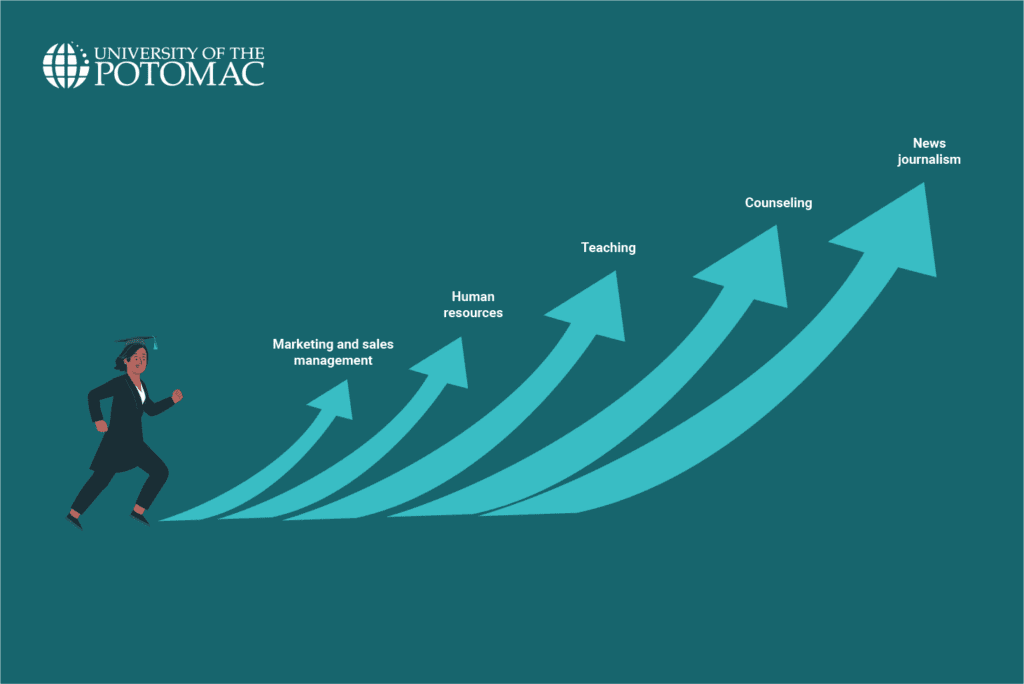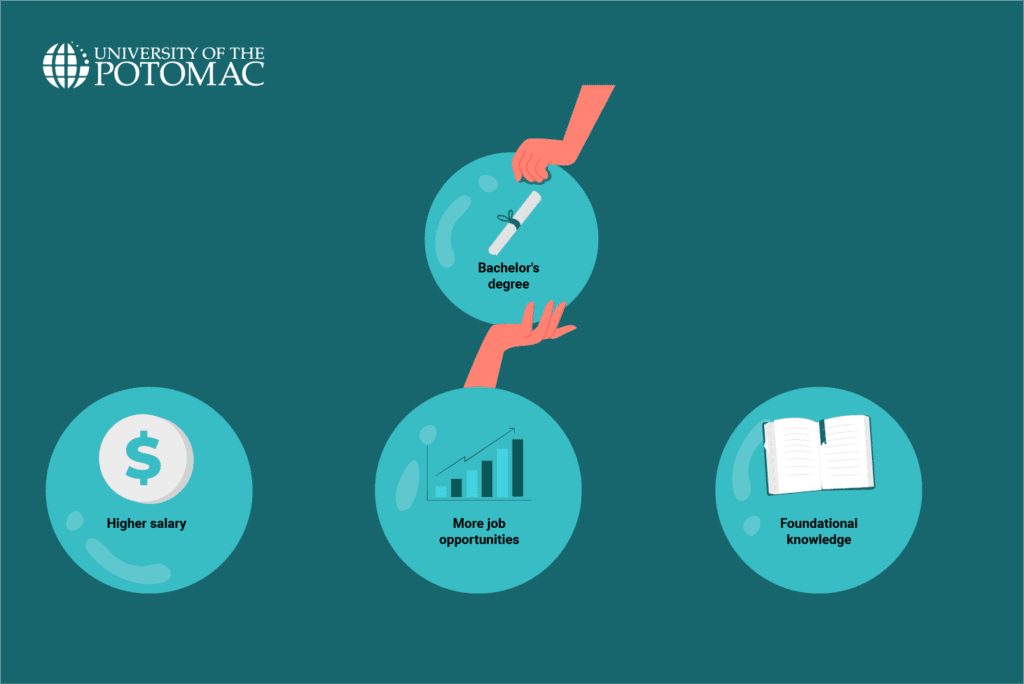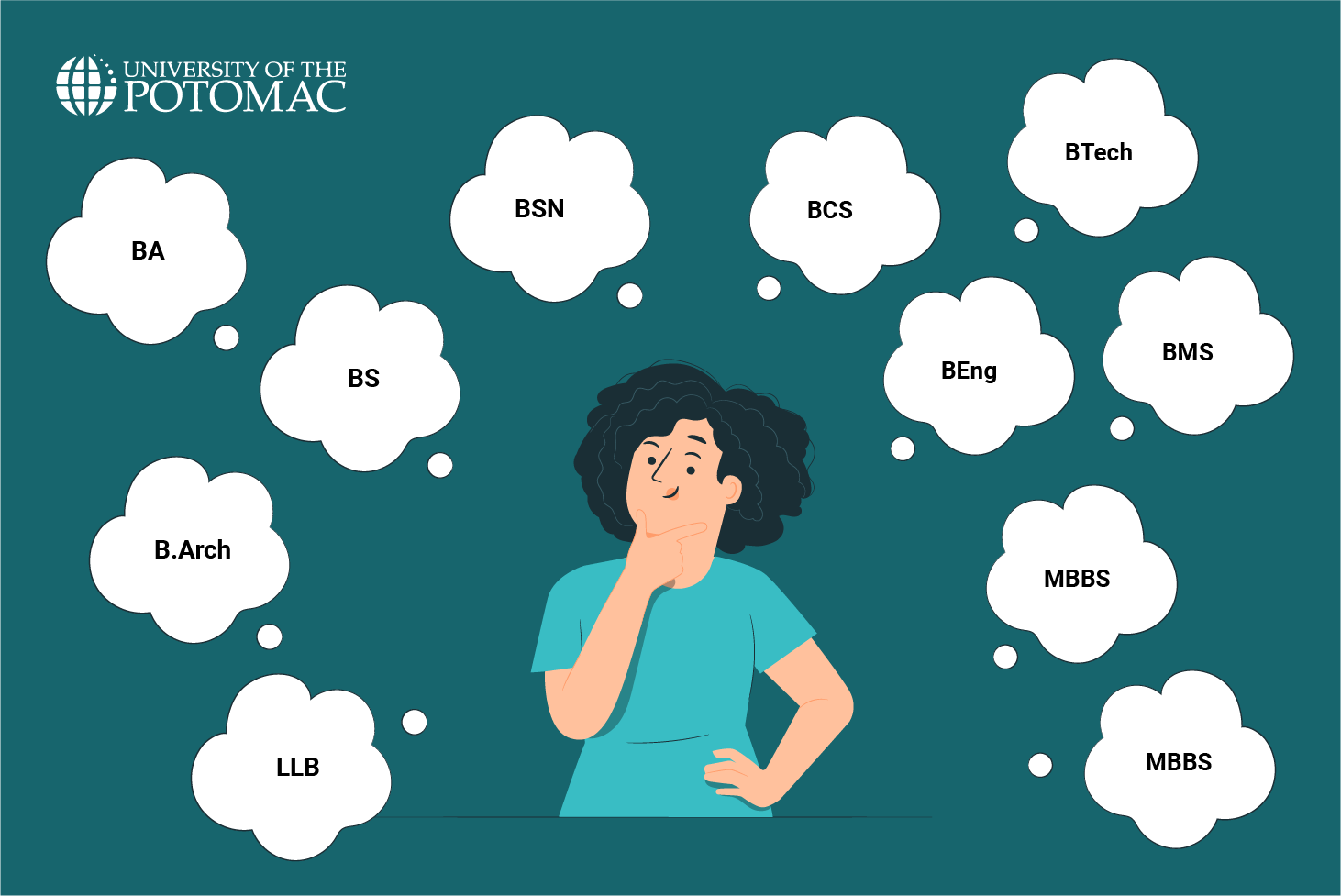There are various types of bachelor’s degrees that can help you develop a thorough understanding of a subject. Continue reading and discover the kinds of bachelor’s degrees you can pursue.
Your bachelor’s degree can determine the classes you take and what career you pursue later in life. Therefore, it’s crucial to discover which degree is right for you and your career path. But with so many types of bachelor’s degrees available, it can be overwhelming to choose one.
So, join us as we explore the different types of undergraduate degrees available and career opportunities after graduation and become confident in the steps ahead.
Major Categories of Bachelor’s Degrees
Bachelor’s degrees can be divided into three major categories: academic, professional, and specialized. Let’s explore each one in more detail.
Academic Bachelor’s Degrees
Academic bachelor’s degrees provide a broad education in a particular field of study.
They focus on theoretical knowledge and research-oriented fields. Examples include:
- Bachelor of Arts (BA)
- Bachelor of Science (BS)
Professional Bachelor’s Degrees
Professional bachelor’s degrees are degrees designed for specific career pathways and practical skills. These degrees often include practical training such as residencies or internships. Examples include:
- Bachelor of Architecture (B.Arch.)
- Bachelor of Medicine (MBBS)
- Bachelor of Laws (LLB)
Specialized Bachelor’s Degrees
Specialized bachelor’s degrees cater to niche fields that require unique skill sets. They provide in-depth knowledge and skills for particular professions. Examples include:
- Bachelor of Fine Arts (BFA)
- Bachelor of Engineering (B.Eng.)
- Bachelor of Biomedical Sciences (BBiomedSC)
- Bachelor of Dental Surgery (BDS)
- Bachelor of Pharmacy (BPharm)
Types of Bachelor’s Degrees and Their Focus Areas
Now let’s explore the different types of bachelor’s degrees and delve into the potential career paths.
Bachelor of Arts (BA)

A BA degree is designed for students who want to develop critical thinking and analysis, written communication, public speaking, and problem-solving skills. You can earn a BA degree in various fields, such as humanities, liberal arts, and social sciences (e.g., Psychology and Sociology).
After earning a BA degree, you can pursue various career paths in:
- Marketing and sales management
- Human resources
- Public relations
- Teaching
- Counseling
- News journalism
Bachelor of Science (BS)
A BS degree is typically centered around technical and science-based disciplines. This degree leans towards practical knowledge and skills, making it more suitable for those who enjoy methodical learning and quantitative analysis.
You can earn a BS degree in fields like business, computer science, biology, mathematics, chemistry, business, and engineering.
So, as a BS graduate, you can go into just about any field, depending on your major. Common career options include research scientist, IT technician, biochemist, lab technician, assistant professor, etc.
Bachelor of Applied Science (BAS)
A Bachelor of Applied Science (BAS) degree is an interdisciplinary degree for students who have completed an Associate of Applied Science (AAS) degree and would benefit from a bachelor’s degree for career and personal advancement.
This degree focuses on practical applications in various industries, such as healthcare and engineering. It allows you to develop communication, critical thinking, problem-solving, ethics, teamwork, and leadership skills.
You can pursue many fields with a BAS degree. Depending on your concentration, you can explore roles in healthcare management, public health informatics, data analysis, hospitality management, marketing, information technology, etc.
Bachelor of Applied Arts (BAA)
A Bachelor of Applied Arts (BAA) degree program that combines theoretical knowledge with practical skills to prepare students for a career in the arts. Key components of a BAA include a strong foundation in the arts, professional practice, and portfolio development.
During your studies, you can also gain real-world experience through internships and other hands-on learning opportunities. After graduating, a BAA can lead to a career in creative industries, such as graphic design, advertising, publishing, photography, etc.
Bachelor of Business Administration (BBA)
A Bachelor of Business Administration (BBA) degree focuses on business and management principles like finance, marketing, and economics. This degree is ideal for students interested in pursuing a career in the business world.
There are endless job opportunities for business administration graduates. After graduating, you can pursue a career as an accountant, account manager, marketing manager, market research analyst, project manager, etc.
Bachelor of Fine Arts (BFA)
A BFA is a degree focused on the intensive study and practice of the visual arts. This degree is ideal for students who want to pursue a professional career in the arts. Depending on your concentration, after graduating, you can pursue a career as a music director, illustrator, art teacher, graphic designer, art director, or web designer.
Typical BFA degrees include music, dance, visual arts, creative writing, and graphic design. These degrees involve more studio and practice-based courses, allowing you to develop your artistic skills and portfolios, in which you present your cumulative work to complete your degree.
Bachelor of Architecture (B.Arch.)
A Bachelor of Architecture degree focuses on architectural design and principles and provides the foundational knowledge, skills, and practical experience required for a career in the field. It often accompanies a trading internship or apprenticeship so students can graduate with applied skills such as project management, computer-assisted animation, design, etc.
An architecture degree can lead to careers in civil architecture, graphic design, urban planning, landscape architecture, restoration, and surveying.
Bachelor of Science in Nursing (BSN)
A Bachelor of Science in Nursing (BSN) degree prepares students for careers in nursing. This degree provides comprehensive nursing training and clinical experience.
Earning a BSN degree provides the freedom to explore many different nursing career paths. Top BSN nursing careers include:
- School nurse
- Nurse manager
- Legal nurse consultant
- Nurse in a medical/surgical setting
- Home healthcare nurse
Additional Specialized Bachelor’s Degrees
Besides the aforementioned bachelor’s degrees, there are also specialized ones in fields like engineering, technology, education, etc. So, follow along as we explore these specialized degrees and what you can do after graduating.
Bachelor of Economics
A Bachelor of Economics degree focuses on economic theories and applications. This degree can lead to careers in public and private sectors in roles that involve business analysis, research, business planning, infrastructure development, and financial markets.
Bachelor of Management Studies (BMS)
A Bachelor of Management Studies (BMS) degree program emphasizes management principles and practices and prepares students for management roles in organizations. This degree can lead to careers as a marketing manager, operations manager, financial analyst, business development executive, etc.
Bachelor of Commerce (BCom)
A Bachelor of Commerce (BCom) degree program focuses on business and financial studies and includes subjects such as finance, marketing, accounting, business planning, and industry analysis. It can lead to career paths as a tax consultant, finance manager, financial analyst, account executive, business executive, etc.
Bachelor of Computer Science (BCS)
A Bachelor of Computer Science (BCS) degree focuses on computing and software development. This degree can lead to various roles in computer programming, database management, computer games, software engineering, API management, etc.
Bachelor of Design (B.Des)
A Bachelor of Design (B.Des.) degree program strongly emphasizes design principles and creative industries. This degree can lead to a career in graphic design, interior design, game design, advertising, product design, and textiles.
Bachelor of Laws (LLB)
A Bachelor of Laws (LLB) degree program focuses on legal studies and the foundations of law. It can lead to a career as a lawyer or legal consultant.
Interested in pursuing a degree?
Fill out the form and get all admission information you need regarding your chosen program.
This will only take a moment.
Message Received!
Thank you for reaching out to us. We will review your message and get right back to you within 24 hours.
If there is an urgent matter and you need to speak to someone immediately you can call at the following phone number:
- We value your privacy.
Bachelor of Engineering (BEng)
A Bachelor of Engineering (BEng) degree program focuses on engineering principles and practices, such as electronics, construction, and mechanics. This degree can lead to career paths in various engineering fields, including aerospace, chemical, civil, electrical, industrial, computer, and mechanical.
Bachelor of Technology (BTech)
A Bachelor of Technology (BTech) degree program strongly emphasizes technological applications in industries. It can lead to careers as a project manager, quality assurance agent, or technology researcher.
Bachelor of Education (BEd)
A Bachelor of Education (B.Ed.) degree program focuses on teaching methodologies and education theory. It leads to careers in the education sector, such as early childhood educator, primary or elementary school teacher, curriculum developer, principal, etc.
Bachelor of Medicine, Bachelor of Surgery (MBBS)
A Bachelor of Medicine/Surgery (MBBS) degree program covers all basic medical sciences and specializations and provides comprehensive medical training and clinical experience. This degree can lead to a career path as a doctor.
Bachelor of Veterinary Science (BVSc)
A Bachelor of Veterinary Science (BVSc) is a degree program that provides foundational training in the anatomy, biochemistry, physiology, and nutrition of domestic and wild animals. It can lead to career paths in veterinary medicine as a veterinarian, animal nutritionist, nature conservation officer, or environmental consultant.
The Importance of Bachelor’s Degrees

A bachelor’s degree has many benefits which can significantly impact several aspects of your life. Let’s explore what makes this credential so important.
Data from the National Center for Education Statistics (NCES) shows that graduates with a bachelor’s degree earn a median annual wage of $66,600. That’s significantly more than the wages of associate degree holders ($49,500) and high school diploma holders($41,800).
Additionally, a bachelor’s degree has become a minimum education requirement for many jobs. Earning a bachelor’s degree opens more doors to job opportunities in your field.
Lastly, a bachelor’s degree provides foundational knowledge and skills in a field of study. This way, a bachelor’s degree prepares you for more advanced degrees, such as master’s and doctoral degrees.
Emerging Trends in Bachelor’s Degrees
The world is changing fast, and so are the skills needed to succeed. Therefore, before choosing what you want to study, you should look into the emerging trends in bachelor’s degrees.
These trends include interdisciplinary programs, which combine knowledge from different disciplines to solve modern problems. One such field is bioinformatics, which merges biology and data science.
Besides interdisciplinary programs, another emerging trend is the growth of online and hybrid degrees. These programs offer the flexibility of online learning with the benefits of face-to-face interaction.
Choosing the Right Bachelor’s Degree for Your Future
Choosing your bachelor’s degree is an important decision that can play a defining role in where your future career takes you.
But how do you make a decision?
You can start by:
- Making a list of your interests and make sure they align with your educational and career aspirations
- Analyzing the demand for various industries and potential career paths
- Researching your path to an advanced degree, such as a master’s degree
- Selecting accredited programs and reputable institutions for quality education
Conclusion
A bachelor’s degree is an invaluable investment in your educational journey and beyond. Whether you want to study liberal arts in a BA or business in a BS, a bachelor’s degree program helps you develop your theoretical and practical knowledge in a field of study.
Deciding to take the next step in your educational journey is never a small decision. Many factors go into choosing the right type of bachelor’s degree for you, and we want to help you every step of the way. If you have any questions or want to discuss degree or career path options, contact UOTP to request more information about your desired degree program.
Frequently Asked Questions (FAQs):
What are the two most common bachelor’s degrees?
The two most common bachelor’s degrees are the Bachelor of Arts (BA) and the Bachelor of Science (BS).
What is a better degree, BA or BS?
Neither degree is better, but one might better suit your academic goals. A BS degree course focuses on reasoning, logic, and quantitative skills, whereas a BA focuses on communication and critical thinking.
What job opportunities are available with a bachelor’s degree?
A large percentage of career paths require a bachelor’s degree. Therefore, earning a bachelor’s degree opens many job opportunities in fields like business, science, technology, healthcare, and liberal arts.










